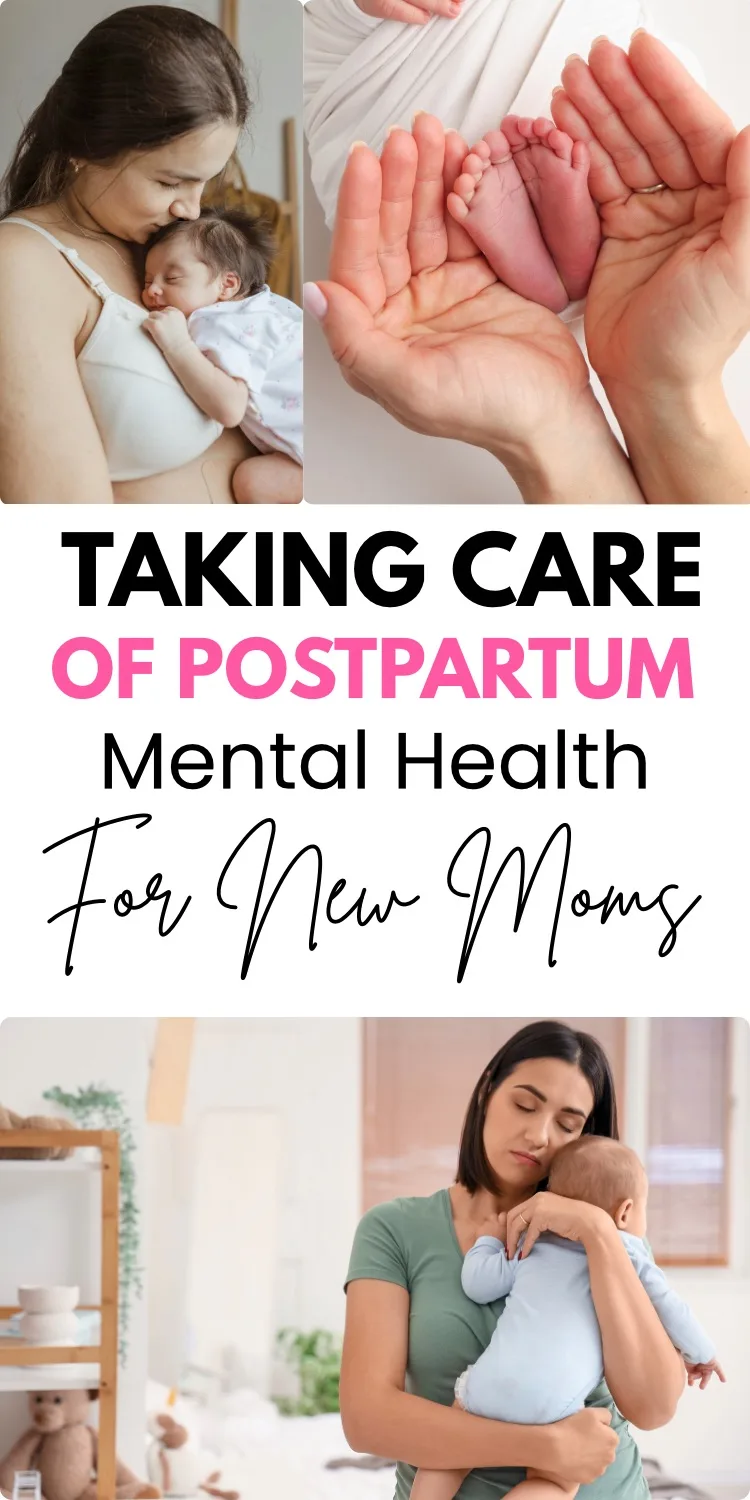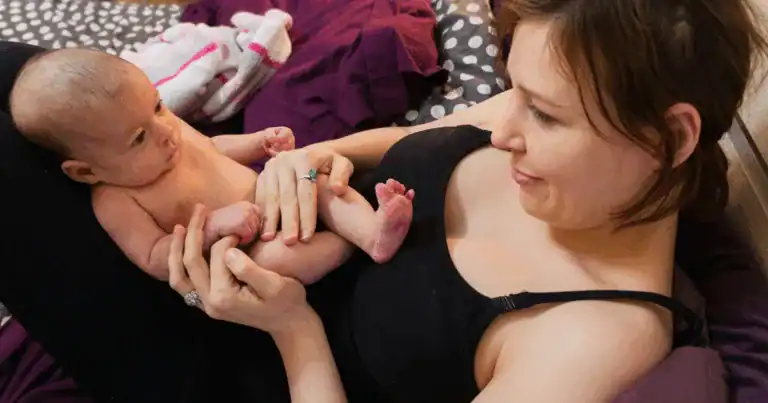How To Take Care Of Your Mental Health As A New Mom: The Ultimate Guide
It can be difficult to learn how to take care of your mental health as a new mom. While you’ve just entered a beautiful season of life, filled with lots of exciting experiences, postpartum can also bring a hefty emotional toll. You may suffer from anxiety and loneliness. Today, we will discuss how to deal with and overcome these difficult emotions while I share my struggles with postpartum mental health.
Disclaimer: I am not a medical professional. Please consult your physician if you experience mental health challenges. Cover Photo by Ümit Bulut on Unsplash
Table of Contents
Why Postpartum Mental Health Matters
Experiencing symptoms of postpartum depression is common. 1 in 8 new moms report these symptoms within a year after giving birth. While postpartum depression cannot always be avoided, since it may be caused by changing hormones, there are still ways to take care of your mental health as a new mom. If you have any symptoms that last more than two weeks or greatly interfere with your life, make sure to give your doctor or a midwife a call. They can assess the severity of your symptoms and give you the proper help you may need.¹
How to Improve Postpartum Sleep and Avoid Burnout

Sleep Deprivation and Mental Health
One way to take care of your mental health as a new mom is to avoid postpartum sleep deprivation. While almost every new mom will experience sleep disturbances, it is still important to make getting enough sleep your top priority.
Of course, this is easier said than done. When I was a new mom, I struggled greatly to get enough sleep. Here are some tips on how to improve your postpartum sleep quality!
Cosleeping Tips for Exhausted Moms

While cosleeping often gets a bad rap (especially in the U.S), it can truly be a lifesaver for sleep in those early postpartum days. My baby refused to sleep in his bassinet for more than two hours at a time. I became extremely sleep deprived, but I didn’t feel comfortable letting him sleep in my bed because I thought it was unsafe. That’s when I came across the Happy Cosleeper on Facebook.
After joining The Happy Cosleeper’s Community, I started learning about safe sleep practices and how to cosleep responsibly. The group gave me the confidence to cosleep safely with my son, which helped me finally get more rest during those exhausting newborn nights. I honestly wish I had known about it sooner, since it’s a total game-changer for tired moms.
While I plan to transition my son to his own bed eventually, I don’t regret cosleeping in those early days. Learning how to do it safely helped me avoid burnout and eased a lot of the nighttime anxiety I was experiencing. I highly recommend you check out the website for more cosleeping information!
Create a Sleep-Friendly Environment (Postpartum Sleep Hygiene)

Sleep hygiene is often overlooked in the early postpartum phase. Any night routine you had most likely went out the window when your baby came along (I know mine did!). However, it’s important to practice some basic sleep hygiene principles to take care of your mental health as a new mom. Here are some quick tips:
1. Aim For Consistent Bedtimes
You (and baby) should try to go to bed around the same time every night. I’ve noticed my son goes to sleep faster when we follow our normal routine before bed.
2. Limit Devices Before Bed
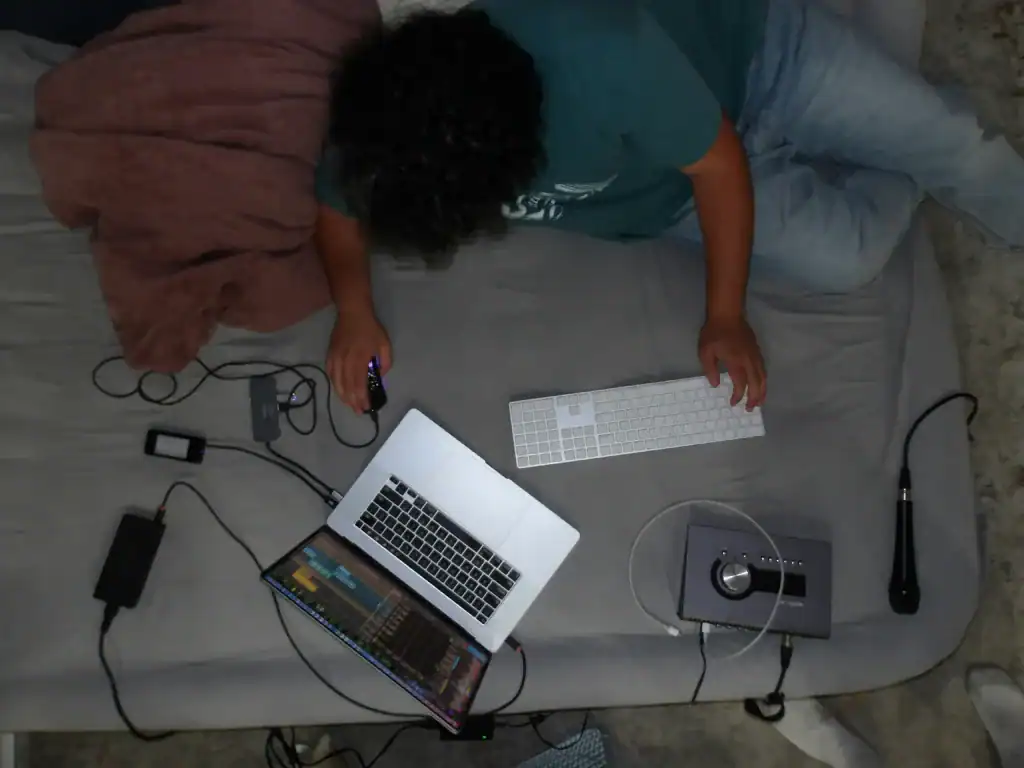
It can be tempting to get in some me time and scroll through social media once your baby falls asleep. This is one of my guilty habits. Avoiding the blue lights from your phone screens will help you sleep better, so either ditch the phone and TV at night, or invest in a pair of blue light glasses!
3. Make the Room Comfortable
Take some time before bed to turn down the air conditioning, put on some white noise, or whatever makes the room more relaxing for you. It’s also helpful to go ahead and set up everything you need for your baby the night before. When my son was a newborn, I kept a small diaper caddy in our room at night for quick diaper changes.
Learn To Silence The Mom Guilt
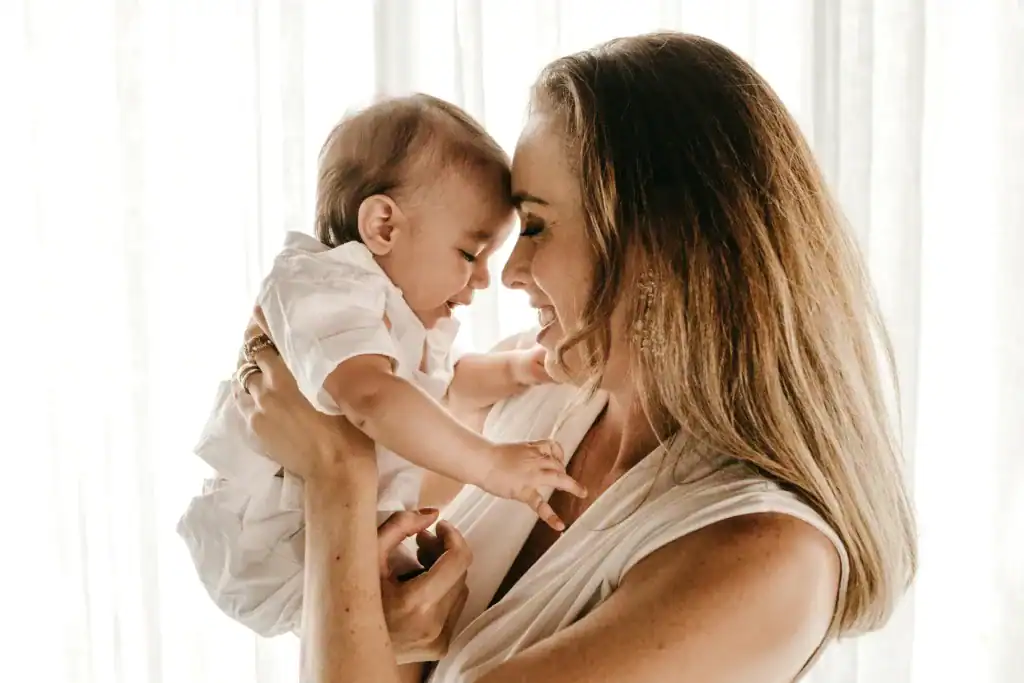
How Mom Guilt Affects Us
Most moms experience some form of “mom guilt”. It’s those feelings of anxiety that you aren’t doing enough, or general feelings of inadequacy. There is an abundance of information available on how to be a good mom, which can lead to setting unrealistic expectations of ourselves.
When my son was born, I expected myself to be perfect. Even forgetting to do small things, like taking daily pictures of his growth, left me feeling guilty. I had internalized my anxieties and was letting them overwhelm me.
The main way to combat this is to increase your self-awareness. You have to ask yourself, is this a valid concern? Do I not spend enough time with my child, or am I doing the best I can? If you find a valid concern, think of ways to change and do better, instead of wallowing in the guilt. This will help you take care of your mental health as a new mom and become a better parent.
Make Time For Self-Care

Making time for self-care postpartum is difficult, but it is worth every minute invested. You may lose your sense of identity for a bit, and that’s perfectly okay. Setting aside time to care for yourself will help you regain your identity.
Things You Can Do Today To Take Care Of Your Mental Health
Reach Out To A Friend
Part of taking care of your mental health as a new mom is avoiding isolation. Postpartum isolation is a real thing. If you can, try to reach out to a friend (or family member) to have some adult conversation. Life is often lonely when it’s just you and an infant for the majority of the day.
Take A Shower

It’s true, when you look good, you feel better. Put your baby in a bouncy seat next to the shower, or have your partner watch them for a bit. If you are feeling up to it, light some candles and listen to your favorite music to make the experience extra special.
Put Your Phone Down
Even 15 minutes without your phone can be refreshing. Take the time to focus on your baby, or just to wind down. Relaxing is a great way to take care of your mental health as a new mom.
Take A Nap
Yes, I know that it is easier said than done. However, if you can take a short nap while your baby naps, you’ll feel better and become more productive for the rest of the day.
Focus On Postpartum Fitness
The importance of postpartum fitness is often overlooked. To take care of your mental health as a new mom, you must get some form of exercise.
Quick Postpartum Fitness Tips
Eat A Snack

Grab a quick protein-rich snack to help fuel your day. Here are 10 protein-packed postpartum snack ideas to help fuel you. You’ll be amazed at how much energy a quick snack can give you, especially while breastfeeding!
Try Gentle Yoga Moves
Yoga is great for postpartum recovery if you are cleared for light exercise. It can even reduce the chances of postpartum depression!² If you don’t know where to start, check out these seven essential yoga poses for new moms.
Incorporate Baby Into Workouts
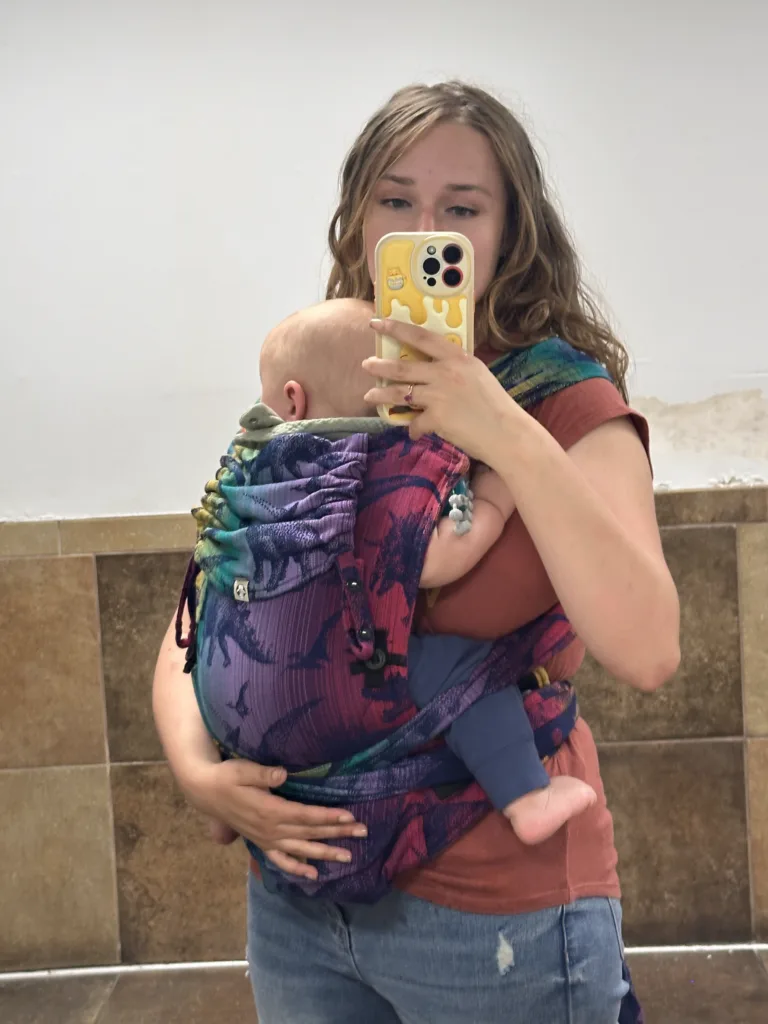
Your baby doesn’t have to be a barrier to working out; they can be part of it! Baby-wearing workouts, stroller walks, and gentle stretches on the floor while your baby plays beside you are great options.
Baby-wearing is one of my favorite ways to get some exercise postpartum. As your baby gets heavier, you become stronger. I love to go for a walk around the neighborhood with my son in his carrier.
Some moms even love “mommy and me” fitness classes (online or in-person) to stay motivated while bonding. Lifting your baby with proper form can help strengthen your arms, shoulders, and legs. Plus, the added giggles make it more fun!
These are excellent ways to take care of your mental health as a new mom without sacrificing connection time.
Check In On Your Emotions

Another important way to take care of your mental health as a new mom is to check in with your emotional state regularly. The days and weeks after birth can feel like a blur, with diaper changes, feeding schedules, and naps (or lack thereof). In all that chaos, it’s easy to lose track of how you’re actually feeling. But ignoring your emotions doesn’t make them disappear. It just pushes them down until they resurface as stress, resentment, or burnout.
Questions To Ask Yourself About Your Emotions
- Am I feeling connected or disconnected?
- Have I laughed or smiled lately?
- What’s been the hardest part of this week?
- What would help me feel more supported right now?
You can journal these answers, talk them out with your partner, or even send a voice note to a trusted friend. Giving your feelings a name and space can help reduce their intensity and make you feel seen.
Permit Yourself to Say No

When you’re trying to take care of your mental health as a new mom, it’s okay to say no to things that drain you. Visitors, social plans, or even replying to texts can sometimes feel like too much. You are not obligated to please everyone.
For example, if someone wants to come see the baby but you haven’t had a moment to shower, eat, or rest, it’s more than okay to decline or reschedule. You can say, “We’re still adjusting and healing, but I’d love to see you soon.” Protecting your peace doesn’t make you rude.
When my son was born, I didn’t allow hospital visitors. I knew that I would not be up for visitors after giving birth, and wanted that special time with just my close family.
Learning to set gentle but firm boundaries is one of the most important ways to take care of your mental health as a new mom. And the more you practice it, the more empowered you’ll feel.
Celebrate Small Wins

There’s a lot of pressure out there to “bounce back” quickly after birth. But that is not what postpartum is about. One of my favorite things to do (especially on the tough days) is to celebrate the small wins. For example, if you got dressed and brushed your teeth, when you didn’t yesterday, that is a win.
When you start acknowledging your efforts, instead of beating yourself up for what didn’t happen, it becomes easier to take care of your mental health as a new mom. You realize you are showing up, even if it looks different than what you expected.
Understand That Healing Isn’t Linear

Lastly, it’s so important to remember that healing (mentally and physically) is not a straight line. Some days you might feel like you’re thriving. Other days, you’ll feel like you’re barely hanging on. That doesn’t mean you’re backsliding or doing something wrong. It just means you’re human.
On the hard days, try to remind yourself:
“This is temporary. My body and mind are healing. I’m doing my best. I’m not alone.”
Taking care of your mental health as a new mom is about showing up, even when it’s hard. It’s about grace and progress. The more you allow space for both the highs and the lows, the more you’ll grow into the type of mom you want to be.
Final Thoughts

If there’s one thing I hope you take away from this, it’s that you matter just as much as your baby.
Your mental health isn’t an afterthought; it’s the foundation for everything else in your motherhood journey. The sleepless nights and the tears you can’t always explain don’t mean you’re failing. They mean you’re human.
Taking care of yourself mentally requires allowing yourself to rest, to ask for help, and to heal.
So give yourself grace. Lean on your village. Celebrate the small wins (even if it’s just brushing your hair or making a sandwich). You are doing the bravest, most important work of all: raising a little human while still figuring out your own path.
You don’t have to be a supermom to be a good mom. You just have to keep showing up.
You’ve got this!
For more information on taking care of yourself postpartum, check out my free glow-up guide. It will show you how to establish routines that will help you take care of your mental health as a new mom.
FAQ
How To Recognize Postpartum Depression?
Knowing when to seek help is a crucial step in learning how to take care of your mental health as a new mom. Signs include persistent sadness, tearfulness, overwhelming guilt, or loss of interest in activities beyond two weeks postpartum. You might also notice severe fatigue, changes in appetite or sleep, or thoughts of harming yourself or your baby. Recognizing these symptoms early helps you get the support you need to take care of your mental health as a new mom. Please make sure to contact your midwife or doctor if you notice these symptoms, and remember that you are not alone.¹
What Resources Are Available to Help Me Take Care of Myself as a New Mom?

Accessing the right resources makes it easier to take care of your mental health as a new mom. Consider:
Maternal Mental Health Hotline (1-833-TLC-MAMA) for 24/7 confidential support.
Postpartum Support International (PSI) for trained professionals and peer groups.
Therapy (in-person or telehealth) specializing in perinatal mood disorders.
Online mom communities where you can share tips on how to take care of your mental health as a new mom in real time.
What Is Postpartum Mental Illness?
Postpartum Mental Illness is a range of mood and anxiety disorders, including postpartum depression, anxiety, and psychosis.³ These all go beyond “baby blues.” Recognizing these as medical conditions is important, since you must seek care from trained professionals.
When Should I Seek Professional Help?
You should reach out when symptoms of depression or anxiety (severe mood swings, hopelessness, or panic) persist beyond two weeks or worsen. Knowing when to take care of your mental health as a new mom means understanding that early intervention with a healthcare provider or therapist is vital to your recovery and well-being.
How Can My Partner Help Me Take Care of Myself as a New Mom?

There are many ways that your partner can help you take care of your mental health as a new mom. They can:
- Share nighttime feeding or diaper duties.
- Encourage naps or short breaks.
- Handle household chores to allow you to rest.
This support can make all the difference in how you experience postpartum.
What’s the Difference Between Baby Blues and Postpartum Depression?
Baby blues, which are characterized by mild mood swings and tearfulness, often last less than two weeks after birth. Postpartum depression involves more intense, longer-lasting symptoms that interfere with daily life.¹
Can Exercise Help Me Take Care of My Mental Health as a New Mom?
Yes! Gentle movement (like walking, yoga stretches, or postnatal exercise) will boost endorphins and support your ability to take care of your mental health as a new mom. Even 10–15 minutes a day can improve mood, reduce anxiety, and enhance sleep quality.
Sources
1. Office on Women’s Health. “Postpartum Depression.” WomensHealth.gov, U.S. Department of Health and Human Services, https://womenshealth.gov/mental-health/mental-health-conditions/postpartum-depression. Accessed 22 June 2025.
2. Shorey, Shefaly, et al. “Prevalence and Incidence of Postpartum Depression among Healthy Mothers: A Systematic Review and Meta-Analysis.” Journal of Psychiatric Research, vol. 104, 2018, pp. 235–248. PubMed Central, https://pmc.ncbi.nlm.nih.gov/articles/PMC6780177/.
3. Center for Women’s Mental Health at MGH. “Postpartum Depression.” Women’s Mental Health, https://womensmentalhealth.org/posts/depression-during-pregnancy-is-a-risk-factor-for-postpartum-depression-does-timing-matter/ Accessed 22 June 2025.


